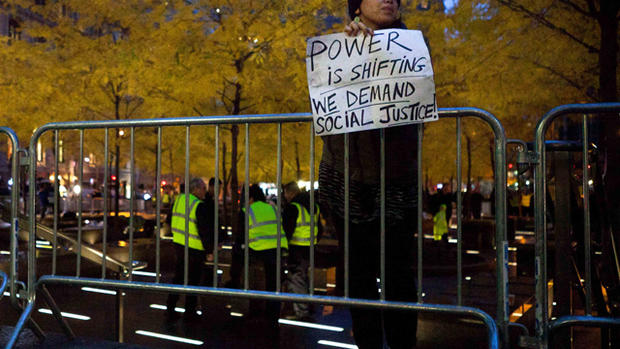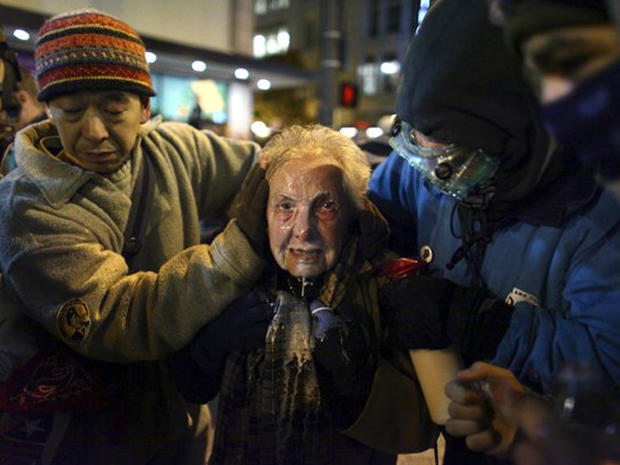After NYC ouster, "Occupy" seeks new direction
NEW YORK - The Occupy Wall Street encampment is gone, but the movement lives on. What nobody knows is just how long it can survive without a place to call home after police hauled away demonstrators in a late night raid.
New York's Zuccotti Park, the privately owned park where protesters against the excesses of capitalism had been camped out since mid-September, was a rallying cry — a symbol of defiance against a government and a society that the protesters wanted to overthrow.
But in recent weeks, the park itself unwittingly morphed into a mirror image of the world it was trying to change: a microcosm of society rife with crime, drug problems and fights over things like real estate and access to medical care.
Some organizers believe the loss of their camp early Tuesday is actually a blessing in disguise.
"This is much bigger than a square plaza in downtown Manhattan," said Han Shan, an organizer who was working with churches to find places for protesters to sleep Tuesday night. "You can't evict an idea whose time has come."
The protesters had vowed to stay put indefinitely. Mayor Michael Bloomberg said he ordered the sweep because health and safety conditions had become "intolerable" in the crowded plaza. The raid was conducted in the middle of the night "to reduce the risk of confrontation" and "to minimize disruption to the surrounding neighborhood," he said.
Pregnant woman pepper sprayed at Occupy Seattle
"Occupy" protesters rebuild UC Berkeley camp
By early Tuesday evening, some protesters were being allowed back into the park two by two. But they could each take only a small bag after a judge ruled Tuesday afternoon that their free speech rights do not extend to pitching a tent and setting up camp for months at a time.
Just a handful of protesters were in the park Wednesday morning, sitting on the park's marble benches, occasionally chanting "We are the 99 percent" and other protest slogans.
Pete Dutro, head of the group's finances, said the loss of the movement's original encampment will open up a dialogue with other cities and take the protest to the next level of action.
"We all knew this was coming," Dutro said. "Now it's time for us to not be tucked away in Zuccotti Park, and have different areas of occupation throughout the city."
Where will they go next remains unclear. Without a place to congregate, protesters will have a difficult time communicating with each other en masse. The leaders of the movement spent most of Tuesday gathering in small groups throughout the city — in church basements, in public plazas and on street corners — and relaying plans in scattered text messages and email.
For now, they're planning to move forward with plans for a day of civil disobedience and marches on Thursday, which has been in the works for weeks. And they'll be joined by angry city leaders who publicly denounced Bloomberg for the nighttime raid.
Robert Harrington, owner of a small importing business in New York, stood outside the barricade with a sign calling for tighter banking regulations.
"To be effective it almost has to move out of the park," Harrington said. "It's like the antiwar movement in the `60s, which started as street theater and grew into something else."
"The issues," he added, "are larger than just this camp."
Mayors talk strategy on Occupy protests
Judge rules against NYC Occupy encampment
The next challenge is figuring out how to decentralize the movement and give it staying power.
"People are really recognizing that we need to build a movement here," Shan said. "What we're dedicated to is not just about occupying space. That's a tactic."
The aggressive raid seemed to mark a shift in the city's dealings with the Wall Street protests. Only a week ago, Bloomberg privately told a group of executives and journalists that he thought reports of problems at the park had been exaggerated and didn't require any immediate intervention.
It was the third raid of a major camp in a span of three days, as police broke up camps Sunday in Portland, Oregon, and Monday in Oakland, California.
The timing did not appear to be coincidental. On Tuesday, authorities acknowledged that police departments across the United States consulted with each other about nonviolent ways to clear encampments. Officers in as many as 40 cities participated in the conference calls.
When New York police began their crackdown at 1 a.m., most of the Occupy Wall Street protesters were sleeping.
Officers arrived by the hundreds and set up powerful klieg lights to illuminate the block. They handed out notices from Brookfield Office Properties, the park's owner, and the city saying that the plaza had to be cleared because it had become unsanitary and hazardous.
Many people left, carrying their belongings with them. Others tried to make a stand, locking arms or even chaining themselves together with bicycle locks.
Dennis Iturrralde was fast asleep on a cot when the shouting woke him up. Dark figures were running through the tents in the dim orange light of streetlamps. Something slammed into the cot, flipping him to the ground.
"They were tearing everything apart," Iturralde said. "They were hitting people, spraying people if they didn't move fast enough."
Within minutes, police in riot gear had swarmed the park, ripping down tents and tarps. The air was filled with the sound of rustling tarps, rumbling garbage trucks, shouts and equipment crashing to the ground.
Around 200 people were arrested, including a member of the City Council and dozens who tried to resist the eviction by linking arms in a tight circle at the center of the park.
At least a half-dozen journalists were arrested later in the day, including a reporter and photographer from The Associated Press who were held for four hours before being released.
In contrast to the scene weeks ago in Oakland, where a similar eviction turned chaotic and violent, the police action was comparatively orderly. But some protesters complained of being hit by police batons and shoved to the ground.
In other news:
Occupy Seattle: A downtown march and rally in support of the Occupy Wall Street movement turned briefly chaotic as police scattered a crowd of rowdy protesters — including a pregnant 19-year-old and an 84-year-old activist — with blasts of pepper spray.
Protest organizers denounced the use of force, saying that police indiscriminately sprayed the chemical irritant at peaceful protesters.
The Occupy Seattle movement released a written statement late Tuesday expressing support for "a 4-foot 10-inch, 84-year-old woman, a priest and a pregnant woman who as of this writing is still in the hospital."
Dorli Rainey is an activist who has supported liberal causes in the Seattle area for decades. A photo showing Rainey being cared for by fellow activists in the immediate aftermath of the police incident appeared on news websites around the world.
Seattle police spokesman Jeff Kappel said he didn't have specifics on the Rainey incident, but he said pepper spray is "is not age specific. No more dangerous to someone who is 10 or someone who is 80."
He added, that if it were harmful, "we probably wouldn't be using pepper spray if that was the case."
Kappel said police had not yet established whether a pregnant woman was involved.
Paramedics examined a handful of people, including a 19-year-old woman who was three-months pregnant, Seattle fire department spokesman Kyle Moore said. The Seattle Times reported on its website that the woman was taken by ambulance to Harborview Medical Center.
Her identity and status were not immediately available.
Occupy Berkeley: Anti-Wall Street activists began rebuilding their tent encampment on the steps of the University of California, Berkeley student plaza and cheered wildly when former U.S. Labor Secretary Robert Reich implored them to take a moral stand against the very rich owning so much of America's wealth.
A daylong strike and peaceful demonstrations against big banks and education cuts culminated in some 4,000 people rallying at the Reich speech on the steps of the same student plaza that first launched the Berkeley Free Speech Movement in the 1960s.
"The days of apathy are over folks," Reich, a professor of public policy at UC Berkeley, said to a roaring crowd at Sproul Hall on Tuesday. "We are losing the moral foundation stone on which this country and our democracy were built. There are some people out there who say we cannot afford education any longer, we cannot provide social services for the poor ... but how can that be true if we are now richer than we have ever been before?"
The protests were disrupted earlier in the day by a campus shooting in inside the Haas School of Business. Officials did not know if the suspect was part of the Occupy Cal movement, said Ute Frey, a spokeswoman for the university.
Occupy San Francisco: Police arrested at least seven people and confiscated nearly a dozen tents at one of several encampments of protesters supporting the Occupy Wall Street movement. Police in riot gear surrounded the area as protesters stood nearby pondering their next move.
KGO-TV reported that police moved in on the small encampment along Market Street around 1:30 a.m. Wednesday. The camp was set up in front of a Bank of America building and was blocking the sidewalk. The other larger encampments in San Francisco were not raided.


